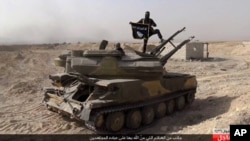The United States says it is looking into whether Islamic State militants used chemical weapons during an attack earlier this week on Kurdish fighters in Iraq, as reported by German officials.
The German Defense Ministry, which is training the Kurds, said about 60 peshmerga fighters suffered injuries consistent with chemical weapons exposure during a battle Wednesday with the Islamic State group.
White House National Security Council spokesman Alistair Baskey said Thursday Washington is seeking more information on the attack. "We continue to take these and all allegations of chemical weapons use very seriously," he said.
U.S. Ambassador to the U.N. Samantha Power said the U.S. is looking into the allegations.
Other U.S. officials went further, saying it is likely the Islamist extremists carried out the attack.
Washington "has credible information" that the agent used in the suspected attack was mustard gas, which the militants likely acquired in Syria, according to an unnamed senior U.S. official quoted in The Wall Street Journal.
The U.S. official did not give any other details on the alleged attack on peshmerga fighters, who are a key element of the U.S.-led military campaign to oust Islamic State extremists from Iraq and Syria.
It is not the first time the Islamic State has been accused of using unconventional weapons. Past reports by U.S. intelligence agencies have suggested the militants used toxic chlorine gas during attacks.
Syrian President Bashar al-Assad has also been accused of, and strongly denies, using chemical weapons during the over four-year civil war in his country.
The Syrian government agreed in 2013 to have international monitors destroy its declared chemical weapons stockpile. There are suspicions Damascus continues to use chlorine, which was not part of the declared stockpile, to attack the rebels.
The global chemical weapons monitoring agency, the Organization for the Prohibition of Chemical Weapons, has been set up to determine whether chemical weapons were used in Syria.
Under a resolution passed last week by the U.N. Security Council, a team of experts will now have the authority to identify those who have used chlorine and other chemicals in attacks in Syria.











